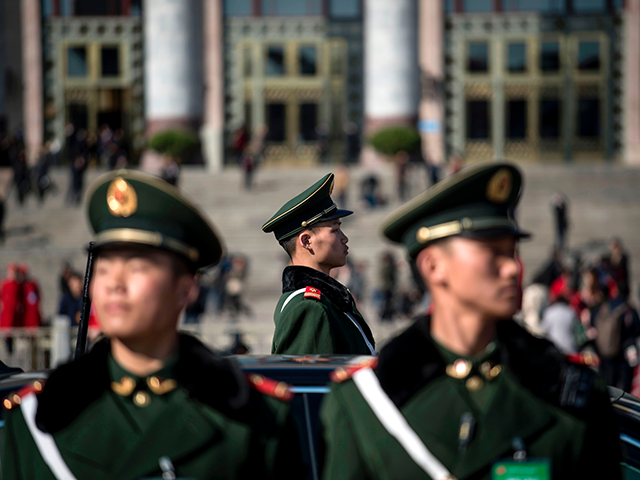The Chinese Communist Party has reportedly placed Hui Ka Yan, the billionaire chairman and founder of China’s gigantic and dangerously indebted Evergrande Group, under police surveillance, reports indicated Wednesday.
This development is unlikely to boost investor confidence in the tottering property company, whose collapse could have severe repercussions for the Chinese economy, and aftershocks felt around the world.
Bloomberg News broke the story Wednesday, reporting that Hui was “placed under police control” this month. His status is delicately referred to as “residential surveillance” by Chinese officials, but it sounds as though Hui has been straight-up detained. He is not under house arrest, but has instead been taken to a “designated location” and his travel documents have been confiscated.
“The measure means he is unable to leave the location, meet or communicate with others without approval, based on China’s Criminal Procedure Law,” Bloomberg explained.
“A person close to Evergrande said Hui had stopped contacting staff over the past few days, while an industry source said he had become totally inaccessible,” Reuters said Wednesday.
The only practical differences between Hui’s status and imprisonment are that his “designated location” is more comfortable than a prison cell, and “residential surveillance” is not supposed to last more than six months.
Bloomberg said the reasons for Hui’s detention were unclear, which is not surprising, since one of the perks of authoritarian tyranny is being able to throw people in jail without explaining why. China has also reportedly detained other Evergrande staff and executives as part of the investigation into the company’s wobbly finances, possibly because Beijing wants to send the message that no company is “too big to fail,” but remains nervous about demolishing Evergrande.
Hui, 64, was considered the richest man in Asia at the peak of Evergrande’s wealth in 2017. His net worth remains well over $3 billion. He started out as a humble steel factory technician from a rural village in the 1980s before founding Evergrande in 1996, becoming the sort of self-made tycoon China celebrates as a symbol of its booming markets, especially since he had a penchant for making investments that agreed with dictator Xi Jinping’s priorities.
“Without the country’s policy to reform higher education, I could not have left the village. Without the country giving me a scholarship of 14 yuan every month, I could not have completed university. Without the country’s good policy to reform and open up, Evergrande would not have what it has today,” Hui said at an awards ceremony in 2018.
“Therefore, everything that Evergrande and I have, they are all given by the Party, by the country, and by society,” he gushed.
As recently as July 2021, he was an honored guest at the hundredth anniversary of the Chinese Communist Party’s founding.
Hui fueled Evergrande’s rapid expansion into China’s dominant real-estate company by taking on staggering amounts of debt, which became a major problem when the bottom fell out of the once-booming property market. Hui’s strategy involved racking up debt to buy property and then selling it quickly at bargain prices, a moneymaking machine that abruptly seized up when regulators began cracking down on heavy debt loads, and even the discounted prices became too high for Chinese consumers.
Evergrande’s liabilities stand at over $300 billion, and the company is having a great deal of trouble restructuring its debts, in part due to ongoing government investigations. On Friday, the company canceled meetings with its creditors because Chinese regulators blocked its plan to issue new bonds against its remaining assets to cover its debt payments.
Evergrande shares plunged 25 percent on Monday after the company missed a bond payment, dragging Chinese property stocks to a nine-month low. SPI Asset Management managing partner Stephen Innes said on Wednesday the tumble “reignited concerns that the country’s housing sector is still deteriorating rather than showing signs of improvement and that financial stability risks are rising.”
A group of Evergrande’s biggest bondholders plans to meet in Hong Kong at the end of October to push a liquidation petition. If the Hong Kong court grants that request, which seems likely unless Evergrande comes up with a workable debt restructuring plan, the collapse of the company will become all but inevitable, as EuroNews explained Wednesday:
Government intervention to support Evergrande and provide immediate liquidity is unlikely. While liquidation remains a possibility, it could be the worst-case scenario for Evergrande, as the company would cease to exist and its debt would be written down to zero, with far-reaching implications for its lenders.
In such a scenario, offshore bondholders would retain the ability to pursue claims against the company’s executives, officers, and offshore assets, offering them some avenue to recover a portion of their lost investment.
This raises the possibility that China detained Hui, without actually pressing charges and tossing him in prison, to reassure angry investors that he will not disappear, and they can still file claims against his personal fortune.

COMMENTS
Please let us know if you're having issues with commenting.